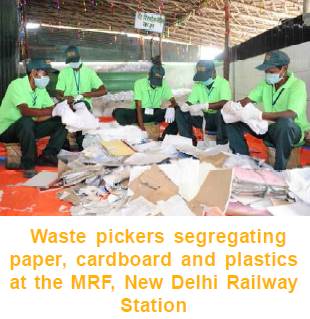|
Chintan and Safai Sena Clean
C hintan, a registered Delhi based NGO, has been in partnership with the Northern Railways at four railway stations in Delhi - New Delhi, Old Delhi, Hazrat Nizamuddin and Anand Vihar to handle waste from trains and platform bins. Under this, Chintan, in partnership with Safai Sena, an independent association of informal sector wastepickers, collects waste from all the trains as they arrive on the platforms, provides liners for bins on the platforms and collects the waste before it spills out and litters the station. The waste is taken to a Material Recovery Facility (MRF) and segregated. The recyclable component is recycled and the wet waste is composted. Highlights of this partnership:• Neither the Northern Railways nor Chintan exchange any payments for this service. • The activity is self-sustaining. • Waste pickers earn their livelihoods from the sale of recyclable materials. • The Railways receive compost for their horticultural purposes. • Chintan also organises mass awareness on using bins for commuters as this is a key waste management problem at the platforms and the stations. Chintan’s partnership with the Northern Railways has been able to implement the Solid Waste (Management and Handling) Rules, 2000 which mandates segregation, recycling and composting. It has also implemented specific sections of the National Environment Policy, 2006 and the National Action Plan on Climate Change, 2009 and the Plastic Waste (Management and Handling) Rules, 2011, all of which mandate involving wastepickers in waste handling. At the New Delhi Railway Station alone, over 300
trains and 3,60,000 passengers come in every day. In several trains
packed, ready-to-eat meals are provided, resulting in large amounts of
waste. Shops, restaurants and the passengers’ own food and packaging
adds to this waste. Previously this waste used to be trashed on
platforms, burned and strewn along the platforms. Paper and other waste
could not be recycled as it was contaminated and dumped into methane
spewing landfills with no landfill gas recovery mechanisms. Chintan and Safai Sena have trained over 115 wastepickers to undertake various aspects of the work and provided them with uniforms and ID cards, so that they are recognised as legitimate waste collectors and recyclers. On an average, this partnership alone handles over 0.85 tonnes of waste each day and approximately 26 tonnes of both wet and dry waste per month from all the four train stations. It provides safe, secure and stable livelihoods to the workers involved in the project. A Material Recovery Facility (MRF) is used for segregating waste and for ensuring that as much as possible is recycled. Waste is segregated into various categories. PET bottles from the waste collected are cut to avoid any refilling and misuse. All the paper, plastics, metals, cardboard, glasses are then sent for recycling. A composting section has been set up by Chintan at its own cost, which composts waste using both the Organic Waste Convertor as well as pits. For the waste pickers, steady livelihoods have resulted in reduced vulnerability to many economic and social risks. They are being able to access medical care and health camps and get personal protective equipment. A significantly cleaner work environment has reduced injuries and diseases. With stable incomes coming in, the waste pickers are also being able to educate their children. By recycling waste, several environmental benefits have also accrued. Greenhouse gases that would be emitted from mining, transportation of raw materials and their processing are now eliminated. The recycling of paper and cardboard is preventing their rotting in landfills and spewing methane, which was the case earlier. Waste is not burnt, hence, carbon dioxide and dioxins are prevented from being released. Also, this activity has reduced the risk of disease as there is no breeding of vectors taking place since waste is no longer dumped in the open, as was widely prevalent at the stations earlier. Through this unique partnership, all stakeholders have been able to demonstrate that the Northern Railways can handle its waste, reduce pollution, create safe livelihood opportunities for the poor and make the railway stations cleaner and greener. q Chitra Mukherjee
|
